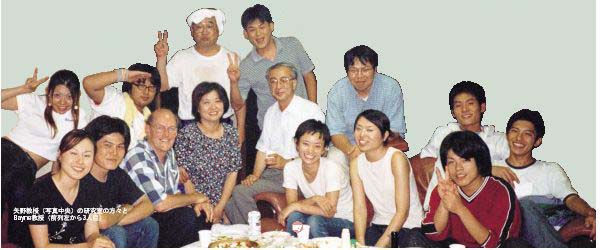The reputations of many Kyushu University faculty members are known around the world. My own interests in the immune systems of non-mammalian species had frequently brought to my attention the name of Tomoki Yano and his associates in the Department of Fisheries, College of Agriculture at Kyudai. So when, in 1998, I was seeking a host for an upcoming sabbatical year, it seemed worthwhile to find out if my desire to know more about Japanese culture, the language and her people could be met by a visit to Fukuoka, where I hoped I might also find a welcome in the Yano laboratory. As it has turned out, a 6-month sabbatical has turned into a total of 12 months over 3 years. I have just kept coming back.
It started in 1999 when I was really fortunate to be able to come to Kyudai with financial support from the Japan Society for the Promotion of Science (JSPS). The great hospitality that characterizes Fukuoka was immediately evident when my host Professor Tomoki Yano and his wife met my wife and me at the airport. Many readers of KYUDAI KOHO know that Kyushu University runs housing facilities at Kashiihama and Maidashi designed to meet the needs of foreign visitors. These facilities spare visitors and their hosts a great deal of red tape, and ease the task of settling in here. For any visitor who may come here hoping to live in a traditional Japanese way, it should be said 'Dream on' Or perhaps 'Get realistic'! Pressures on housing make that a dream, but the university's housing is really the best answer, and ensures comfort, safety, efficiency and proximity to public transportation.
To the eyes of a visitor from Europe or North America, some of the buildings on Kyudai's Hakozaki campus appear drab and in need of a major renovation. But appearance is the superficial affair! Go inside; work with the students and faculty, and you will quickly learn that appearances reflect neither the quality nor the quantity of scholarly work that goes on within. These old buildings actually house a wide array of top notch, modern equipment. The atmosphere is dynamic, really conducive to work. My hosts have been unfailing in their efforts to help me achieve our goals. Similarly, they have been really appreciative of any small help I have been able to provide in return. I have spoken with many foreign visitors and, without exception, they remark on the high quality of scholarship here, and tell stories of the warm welcomes they received among their work group.
My academic interests center on immunology and, in particular, natural defenses against potential pathogens. My home university (Oregon State University in the U.S.) lacks a medical school, but agriculture and the basic sciences are major components. So I have focused my research on immunity in fishes. Professor Yano's group in Fukuoka shares this interest. When I first came (1999), I wanted to learn some molecular biology, since this has become so crucial to modern research in biology. I could not have found a better group anywhere. Friendliness, technical skill, awareness and use of the most 'cutting edge' research protocols, a firm grasp of the basic biology: all of these were qualities I met here. Of paramount importance to me, I also was met by a willingness to teach me what I wanted to learn. Plus I had access to the most modern equipment. In just six months, I did more and learned more than I could ever have dreamed possible. But, as with almost any research project, loose ends remained when it was time to leave. So I returned; not once but three times; and every time the welcome and the experience has been as good as that first visit.
Among the reasons why my wife and I found it easy to enjoy life here is the explicit steps Kyudai and the city of Fukuoka have taken to reach out to foreigners. On the Hakozaki campus there is a Center for International Scholars, an excellent library, and crowds of friendly people of all ages. The students demonstrate values we appreciate: respect, courteousness, curiosity, fun-loving/humorous, sharing. In Tenjin (the city center), there are two offices where the staff do all they can to help answer questions, provide literature and more. There are even English-language newsletters telling of upcoming cultural events. And that means a lot because this is a vibrant and stimulating place, a culturally alive city! The variety of the architecture, dress styles, cultural events, cuisine (including yatai!), the ease with which you can get around in the city, the shopping and more; all contribute to make this a wonderful place to live and work. And getting around is easy, since most of the buses and all of the subway trains have signs in English, good maps are easy to find, and one can get almost anywhere by bicycle.
To our many friends in Fukuoka, we wish you success keeping up your traditions. Thank you for welcoming us into your community!
 |
| 矢野教授(写真中央)の研究室の方々とBayne教授(前列左から3人目) |